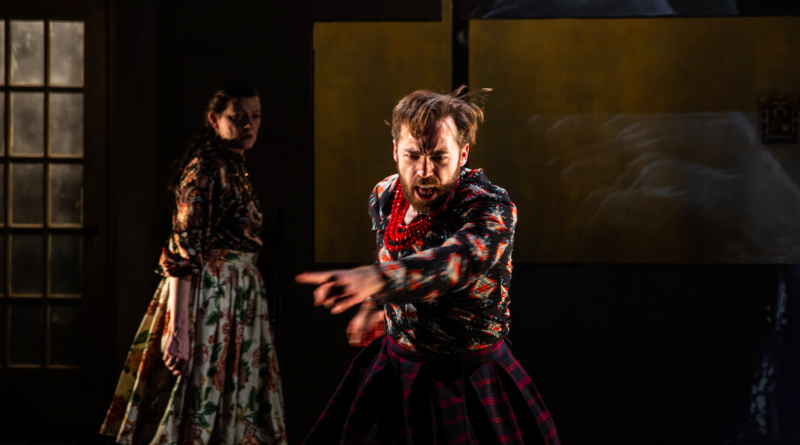INTERVIEW: Modern American family, say hello to Dostoevsky
Photo: The Karamazovs, written and directed by Anna Brenner, stars Tymberly Canale and Ross Cowan. Photo courtesy of Maria Baranova / Provided by Everyman Agency with permission.
Fyodor Dostoevsky’s The Brothers Karamazov is a landmark piece of literature that continues to inspire and engage readers. Some of that inspiration has seeped over into Anna Brenner, writer and director of a new adaptation called The Karamazovs, which reimagines the original story as a drama involving an American family grieving the death of their father.
The show, which uses text, movement and live video, asks deep questions about identity, gender, justice, love, death and life, according to press notes. The narrative focuses on Fyodor, who is dying in a small town in the middle of the United States. His grown children come home, and a dispute involving Papa’s money ensues. As they are figuring out how much they’ve grown apart, the characters in the play are caught off guard and genuinely shocked when one of the siblings is charged with murder.
Brenner has worked on several shows, including In This Hope: A Pericles Project, Cockfight and The Hotel Colors, among other productions. She has previously collaborated with Laurie Anderson, and she served as artistic associate at Classic Stage Company.
The Karamazovs plays March 4-21 at the New Ohio Theatre in the West Village. Recently Hollywood Soapbox exchanged emails with Brenner about the new show. Questions and answers have been slightly edited for style.
What’s it like to direct your own work?
I’ve loved it, and because the piece has been in development over the past two years with most of the ensemble, the writing and the directing have felt pretty organic. I’d bring in text to explore, and we’d do improvisations and compositions. Then I’d go off and rewrite. A few months later we’d come back together and see what worked and what was missing. Wrestling with this material has been really satisfying both alone at my desk and in the rehearsal room with the ensemble. Since I typically think of myself first as a director, when I was alone writing, I was always thinking about adding layers to the world through staging, design, atmosphere and movement. I want to try to get to the interior life of these characters and their relationships, which is natural to do in a novel, but on stage often needs to exist beyond language. So considering how the world of the play supported that mission has felt important.
How close does this align to the source material?
We’ve tried to capture the spirit of the novel — its formal playfulness, expressive tangents and wild plot unfoldings — while allowing the heart of the piece to rest in the characters’ motivations, relationships and deep internal lives. The novel looks at siblings in times of crisis, when they don’t get what they want, when they experience loss, or lose faith in what they love and believe. This exploration ultimately reveals the impact of abuse and trauma within a family, and a culture, and questions how to get free of that history. Those themes are still central in our play, but we’ve tried to distill them more directly and with a contemporary lens, inviting in theatricality and a need to share this story with a live audience.
Do you feel that some of these themes are timeless and universal, speaking to both Dostoevsky’s time and 2020?
Completely! I find it hugely relieving that in the present moment I can connect back through history to all people, across time and culture, who were basically asking the same questions — how should I live? What do I believe? How can I feel free? How can I love and forgive? Etc. In particular, this seems relevant in moments of history that are especially fraught, when people are really looking at the systems they have blindly accepted for years. These questions become even more important, and I think that’s the time we’re living in now, and can look back to Dostoevsky, and these characters, to consider which path should we take. Dostoevsky seemed to say that we must always consider the other. We must not get lost only in ourselves. We are a part of something much bigger, and I think that works across time and place, fact and fiction even. It can all teach us something.
Does it help if audience members know the original novel?
I think the piece will be accessible and entertaining (even meaningful) to audiences who don’t know the novel. For those who do, I’m hoping they take some delight in our choices and maybe even run back to reread parts of the novel.
When did you fall in love with theater?
I grew up in rural Michigan, so I lived on books and movies, and I came to know theater first from reading — mostly Tennessee Williams and Chekhov off of my grandfather’s book shelf. I guess you could say I had a kind of isolating, but idyllic childhood running around in nature, observing and thinking about what life was like out there, always wanting to create some alternate reality. I really lucked out in college where I immediately found my people and started making work, feeling a part of a community in a way I never had before. I loved collaborating and sharing ideas in that way and became completely obsessed, especially with experimental theater, ensemble-based work and adaptation.
By John Soltes / Publisher / John@HollywoodSoapbox.com
The Karamazovs, written and directed by Anna Brenner, plays March 4-21 at the New Ohio Theatre in the West Village. Click here for more information and tickets.

